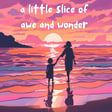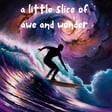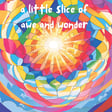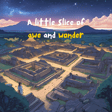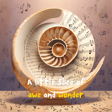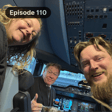Become a Creator today!Start creating today - Share your story with the world!
Start for free
00:00:00
00:00:01

The First Slice
Hi! My name is Garrett aka Scooter. I'm a musician and a speech pathologist, and I just want to introduce these two rad emotions to you, awe and wonder.
Each week, I'm gonna share some tiny snippets of awe with you -- a quote, fun facts, some awe anecdotes, along with some researched and practical ways to cultivate more awe and wonder in your life.
00:00 Introduction (+ Go Yama Remix)
02:55 Defining Awe and Wonder
08:56 The Eight Wonders of the World
17:03 Final Thoughts and Recommendations
Music by Go Yama
Link to the book Awe
Science of Awe
Would love to hear some awe anecdotes! garrett@oyamaslp.com
Transcript
Introduction to Awe and Wonder
00:00:20
Speaker
Hey fellow humans, welcome to a little slice of awe and wonder, just a cozy little podcast about my two favorite emotions. So each week I want to try and share some snippets of awe with you, quote some fun facts, some awe anecdotes from friends and family and random internet people, along with some researched and practical ways to cultivate more awe and wonder in your life.
Modern Disconnection and Awe as Remedy
00:00:45
Speaker
And that's just because, you know, I feel like there's this tension in the air these days, this vague sense of unease, you know, no matter where you are in the world. And there's more tools to connect than we've ever had before. But society, at least at scale, it feels so, you know, so much more fragmented and almost dystopian. And, you know, we can literally learn about anything.
00:01:07
Speaker
in the world more than we have ever been able to and yet we are more disinterested and bored than ever before. You know, I've definitely felt that way. My intention is fractured and fragmented and can barely watch a movie now without going to
00:01:24
Speaker
check my phone when I'm getting bored. And all the little things that divide us seem to be just been blown out of proportion. My own mess ups that just haunt me. Sometimes I just need a reminder that at big enough scales, those things really don't matter.
00:01:41
Speaker
and all in wonder had this unique ability to cut through all that and remind us that we're just floating on this rock in unfathomably large space and walking around in this seriously this miracle this crazy world that's just so full of mysteries that we think we started to understand it but you know we've only scratched the surface we've taken that for granted and so i feel like all in wonder are really the antidotes to these prevailing ailments of our time you know anxiety
00:02:11
Speaker
boredom, malaise, pickleball.
00:02:14
Speaker
And they've certainly been a balm for my own anxiety and insomnia. And I hope they can be for you too. So, you know, feel free to listen to this when you're feeling stressed or you're anxious. You know, you've got insomnia and you're trying to find a leftover breakfast burrito in your fridge. You're feeling overwhelmed by this vague dystopian future. This podcast is for those times. And so I hope you get a slice of relief and knowing that there's someone else feeling the same as you.
Scientific Study of Awe
00:02:56
Speaker
So let's start with some definitions. In contrast, the most basic emotions like happy, sad, super pissed off, awe and wonder have been a bit harder to pin down. And scientifically, there's still not a huge, a wide consensus. That's the exact definition. And the science is still young. So just a couple decades ago, they didn't even really think that these things were that important. So it's about,
00:03:22
Speaker
15 years old, the literature on awe and wonder. And so they've just sort of begun to scratch the surface on what these emotions are and what they do. I'm taking a lot of this content from one of the primary researchers, UC Berkeley professor of psychology, Dr. Keltner, who wrote a book entitled awe, which is yeah, awesome.
00:03:46
Speaker
And it really brings a lot of this our science to life. So definitely recommend that.
00:03:53
Speaker
And in the book, they trace the etymology of awe.
Defining Awe and Wonder
00:03:57
Speaker
And it turns out that it was derived from words in Old English and Old Norse that originally expressed a fear and a dread towards the divine being. So it really had this negative valence in the beginning. And it eventually evolved with a little bit more positive connotation. So it was a dread mingled with veneration.
00:04:18
Speaker
a reverential or respectful fear, the attitude of a mind subdued to profound reverence and the presence of supreme authority, a moral greatness or sublimity or mysterious sacredness. So it slowly started to evolve these more positive connotations. And in the science, again, that there's this vagueness, it's often conflated with the emotion of elevation, which is something like an inspiration or an admiration. But yeah.
00:04:48
Speaker
as defined in the book, which is the definition I'll use.
00:04:52
Speaker
is the feeling of being in the presence of something vast that transcends your current understanding of the world. So I'll say that again, this is the modern definition of awe. Awe is the feeling of being in the presence of something vast that transcends your current understanding of the world. So we got these two essential features there, this perceived vastness and a need to accommodate that vastness.
00:05:19
Speaker
And so the vastness can be a physical vastness, like when you look out at the sky and see all the stars. You know, when you look at the Grand Canyon, look at a huge redwood, something like that. But it could also be perceived vastness at a really deep, profound idea.
00:05:38
Speaker
You know, think about something that changed your perspective on the world. Or it could be looking at a piece of art that has this depth that feels really vast conceptually for you. So either of these can count as vastness. And then, you know, a need to accommodate that. So your whole worldview now is flipped. Something changed about it. And so you have to figure out how to now navigate the world in this new way.
00:06:02
Speaker
And so I'll move to wonder now. And these emotions are often conflated, and I'll probably be kind of conflating them in this podcast. But awe is this sort of passive feeling. So you feel this vastness and it affects you, changes your worldview. And wonder is this active feeling that you get after feeling this mystery that evokes awe. So it's a curiosity. It's something where you want to move towards understanding.
00:06:30
Speaker
that thing. So wonder is that the active pursuit of understanding and exploring the mysteries that evoke awe. So again, awe is the emotional response to vastness and mystery, and wonder is the exploratory response to those same experiences.
Benefits of Experiencing Awe
00:06:47
Speaker
And it has amazing effects on our physiology, on our emotional mental states.
00:06:53
Speaker
It's associated with an increased connectedness with other people, decreased focused on self, which is then associated with decreased anxiety and depression. A tendency to experience awe is also associated with other positive character traits. So people that are more wise, more creative, more grateful, they tend to experience awe more often.
00:07:16
Speaker
And also, you know, inflammation, decreased inflammation, bam. So all these reasons to really embrace awe and wonder scientifically. There are all these proposed flavors of awe as well.
Forms and Phenomena of Awe
00:07:31
Speaker
One is threat. So something like an extreme weather event, like, you know, watching a
00:07:37
Speaker
hurricane or tornado wipe something out the second flavor might be something like beauty so a great work of art or nature a third is is ability so watching the Olympics watching a child prodigy
00:07:52
Speaker
you know, like a two year old guitarist just shredding or watching these kids skateboarders in the Olympics. It's just crazy. Another one is virtue. So hearing about the lives of really saintly people who have just, you know, inspired many, their moral courage. And also there's a supernatural flavor. So, you know, angels, ghosts, that sort of thing.
00:08:18
Speaker
These were all proposed by Keltner and Haight, and there aren't experimentally verified bases for these categories, but they are recognized patterns out of a huge repository of different anecdotes.
00:08:32
Speaker
And I think they make sense. So just an overview, awe is the emotional response to the vast mysteries that we don't understand. And wonder moves us towards the mystery. It puts us into action, sort of that curiosity about it.
00:08:57
Speaker
Usually, I'm going to have a little awe anecdote here from a friend. But in this first episode, I want to give more context. And so I want to talk about the eight wonders of the world that are described in this book awe. And each of the anecdotes that we'll eventually talk about here will be connected to one of these wonders. So these are just things that have been seen to reliably produce awe in people.
00:09:27
Speaker
So kind of similar to the flavors in a way, but they are as follows. So the first one is witnessing moral beauty. So, you know, people standing up for what they believe in. When you see Gandhi, where you see this beautiful moral courage really incites awe in people.
00:09:49
Speaker
And it doesn't have to be big, it doesn't have to be Gandhi, it can be a really small thing. In my own neighborhood the other day, I saw this guy, he was walking around with this flower arrangement, looked cool, and there's a young girl and a mom, and the kid was like, oh, I want that. And the mom was like, well, maybe you can go see it, we can ask him, but you can't take it.
00:10:11
Speaker
And the guy was like, hey, does she want one of these? I'm actually making these for people in the neighborhood. So just give me your address and I'll send one over. And the kid was so psyched. And I was just like, wow, you didn't have to do that. That was really sweet. So I thought that was a tiny little, it just incited this tiny little spark of awe in me.
00:10:33
Speaker
The second one, so first one's moral beauty, the second one is collective movement. So, you know, that's, that's Dan. That's, you know, doing the wave at the baseball game. One really awesome little study that is one of my favorite studies is they took these 14 month old babies.
00:10:53
Speaker
And there's two groups one of the group of babies they bounce them in time with an experimenter So they're there and these little baby carriers
00:11:04
Speaker
and they're watching another researcher in front of them and they're either bouncing on time with them or out of time with them. And somehow the babies that were bounced in time with the researchers ended up being more socially connected with those researchers. They wanted to help them more. They were willing to pick up stuff.
00:11:24
Speaker
for these researchers where if you're bounced out of time, they were less likely to do that. So yeah, collective movement is powerful. One reason to go to the club, I guess.
00:11:36
Speaker
So the third one is nature. And, you know, come on, man, obviously. Majestic waterfall, you know, the view of Earth from space. I just had to do a webinar last week and I talked a bit about ants. Ants as a species are arguably the most successful species on the planet. There's over 16,000 species of ants basically on every continent and weighed in total.
00:12:03
Speaker
If you took up all the ants, you put them in a pile, and you took up all the humans, and you put them up in the pile, all the eight billion humans, they would actually weigh the same, which is just mind-blowing. And ants, the obvious one they can carry up to 50 times their own body weight, pretty crazy. So nature is just full of incredible awe-inspiring things.
00:12:27
Speaker
So where are we at? We got moral beauty, collective movement, nature, and then visual design. So this is art, you know, the basic elements of design, line, shape, color, texture, space, and then putting them together in these intricate ways somehow evokes awe in humans. And why is that? I don't know. But I love going to the
00:12:47
Speaker
art galleries. I love going to the museum. I got a membership to the LACMA. One little tip is that rather than spending 15 minutes just speeding through an exhibit, just spending all that 15 minutes in one space, it's the way you dispose your attention also affects what you see. There's so many places going to team lab in Tokyo for the first time. It's just such a
00:13:13
Speaker
beautiful environment, it really evokes awe in you. And then my favorite is music. I know not everyone is predisposed to love music, but man, music is just an incredible, incredible phenomenon.
00:13:29
Speaker
And I remember being a kid and something about hearing my first, wanting to learn one of my first guitar solos, thinking back to like the Steve Vai solo I wanted to learn. I remember I played that CD back thousands of times, just every little bend in every way that one of those notes was played just was so magic to me. And maybe that's an example of wonder is that I was so taken aback that I had to figure out
00:13:58
Speaker
what was going on. So music, that's a big one. Go see some concerts. Spirituality, and this is cross religious lines, but you know, whether that be through prayer or meditation or being in a group.
00:14:13
Speaker
spirituality is a powerful, powerful way to experience awe and to remember that there's this vast mystery outside of the typical everyday. It's a humility that
00:14:29
Speaker
There's so much that we don't understand and that when we walk around and we think that we got it all, that we understand everything, that we truly, we don't. Yeah. So spirituality is a way to remember that we are more than just the everyday stuff that we see.
00:14:48
Speaker
Also, big ideas. So again, we were going back to the definition of awe. It's like perceived vastness, right? So a big idea can evoke this sense of vastness. This idea that our microbiome, right? That's hot these days. We found out we are more bacterial cells than our own human cells.
00:15:11
Speaker
So we're really more other individual organisms than we are our own self. And that really calls into question, you know, what are we? Are we just one human? Are we a collective intelligence? So that is an idea that that will really trigger that perceived vastness, thinking about how many bacteria live inside you.
00:15:36
Speaker
And I might include poetry in this because there are also big ideas that can't be explicitly expressed in scientific studies, let's say. I love this little... There's this idea of a Japanese garden they often put in Zen gardens. They put 15 stones in the garden, but only up to 14 can be seen from any one place in the garden. So there's no way to explicitly see the entire picture. So this is like how we walk around the world.
00:16:05
Speaker
We walk around thinking we see all the stones, but really, actually almost all of them are hidden from us. So the final one, this takes us to encountering the beginning and the end of life. So this birth and death.
00:16:21
Speaker
Nothing else like that will humble you. Seeing the beginning and the end of life that we take so much for granted. So yeah, that's it. The eight wonders of the world. Things that reliably bring humans into awe. Moral beauty, collective movement, nature, visual design, music, spirituality, big ideas, and encountering life and death.
00:16:45
Speaker
So in future episodes, I'll basically talk about these eight wonders as part of anecdotes with my friends and other people. So I hope that these stories might bring this to life in a different way.
Book Recommendation and Reflection
00:17:02
Speaker
So just my recommendations for this week is to check out this book by Dr. Keltner. I'll leave the link in the show notes. And I'll leave you with a quote from the Zen Buddhist master, Thich Nhat Hanh, which you'll be pleased to know that my iPhone auto corrected to
00:17:19
Speaker
Thigh chat hang when I was writing this quote, he wrote these awesome books, you know, the how to series, how to love, how to eat the full of wisdom and hope. But the quote is the whole world is a miracle that we don't even recognize. So I find that to be true. The world's full of mysteries, you know, big and small.
00:17:40
Speaker
and we rarely stop to consider them but they're there waiting for us to notice them so take a moment today look up in a different direction look up at the sky or if you don't if you're always looking at the sky look at the ground and and just let yourself be open to whatever all wonder might come your way so until next time take care and keep looking for those little slices of all and wonder in your life

